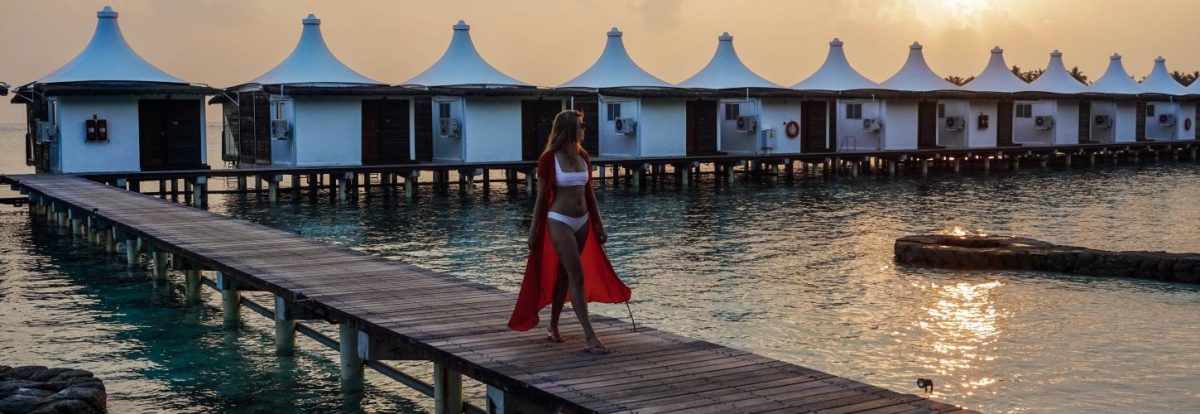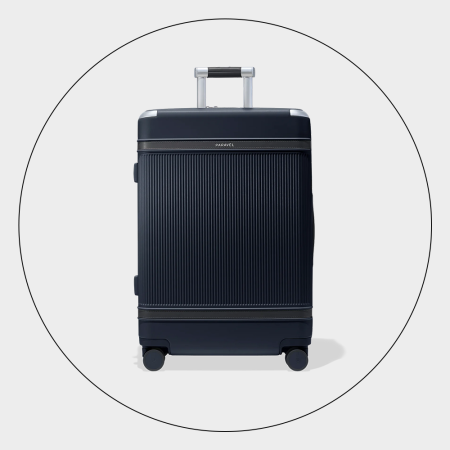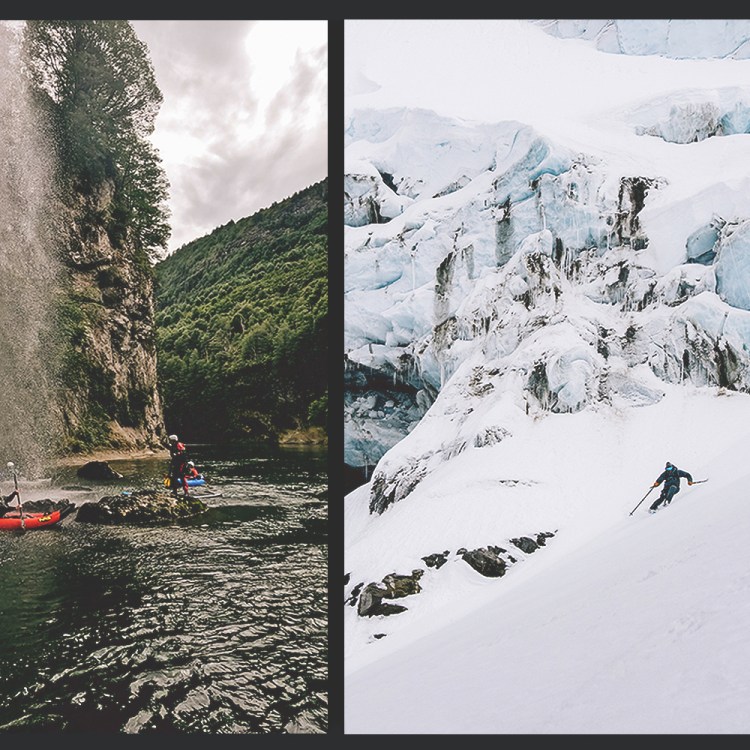Looking to get away from it all? The Maldives is about as far away from home as you can get.
A 12-hour time difference from the U.S., the Republic of the Maldives is an archipelago in the Arabian Sea, located southwest of Sri Lanka and India.
The country is comprised of over 1,190 islands, which are part of 26 atolls – ring-shaped coral reefs, often perched atop extinct volcano or seamounts – stretching across approximately 115 square miles.
The Maldives is an island nation where the water really is that teal and the sky really is that blue. It exists in a brighter color palette, both above and below water.
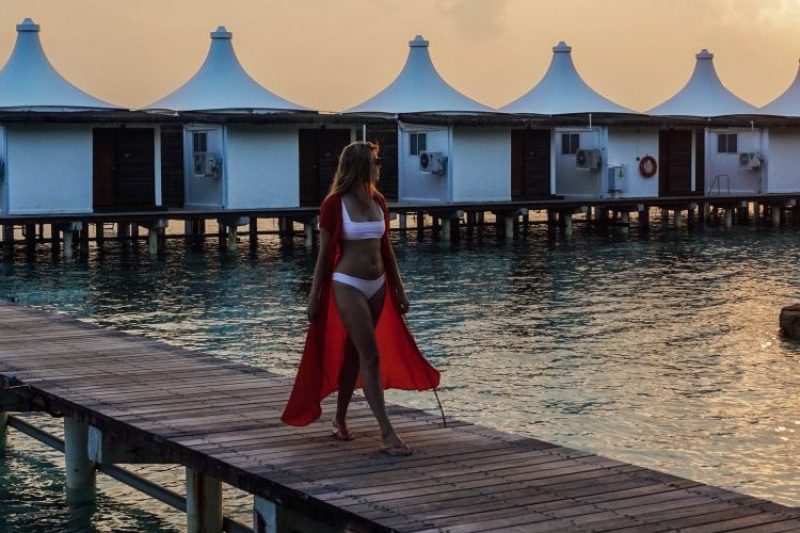
Our Arrival
After a day in Shanghai (a layover of dim sum and walking the Bund to see the epic skyline) and a week in India – seeing the Taj Mahal, attending my friend’s 3-day Indian wedding extravaganza, choking on the New Delhi smog smoke, and surviving a T-bone car collision – we (my fiancé and I) couldn’t wait to get to the Maldives to relax and recover.
We flew into Malé, the capital. It’s a quaint island airport with short lines, quick customs, and open-air shops. Pick up some cash and aloe before heading to your final destination, as some resorts lack ATMs (although all seem to have basic sunscreen, toiletries, water shoes, floaties, and other island life necessities).
Remember that you are entering a Muslim country; so be sure to research the restrictions on imports.
Seaplane Transfer
We found our prearranged transport amongst the lines of numbered desks for tour companies and were bused to the seaplane transfer dock. While some hotels and resorts are accessible by speedboat, most require a seaplane transfer.
At the port, we drank in the view and a cold beer (a luxury after a week in the sober state of Gujarat) while we waited for our seaplane.
Tip: Remember to build in a generous buffer for your seaplane transfers. On the way in, you can always take the next plane, but you don’t want to miss your flight out. On our return, the seaplane was delayed an hour and a half due to weather. It was no problem since we could soak up some rays and enjoy a last drink at the Beach Bar.
After changing into lighter clothes, we boarded our seaplane and skidded off to the Meemu Atoll.
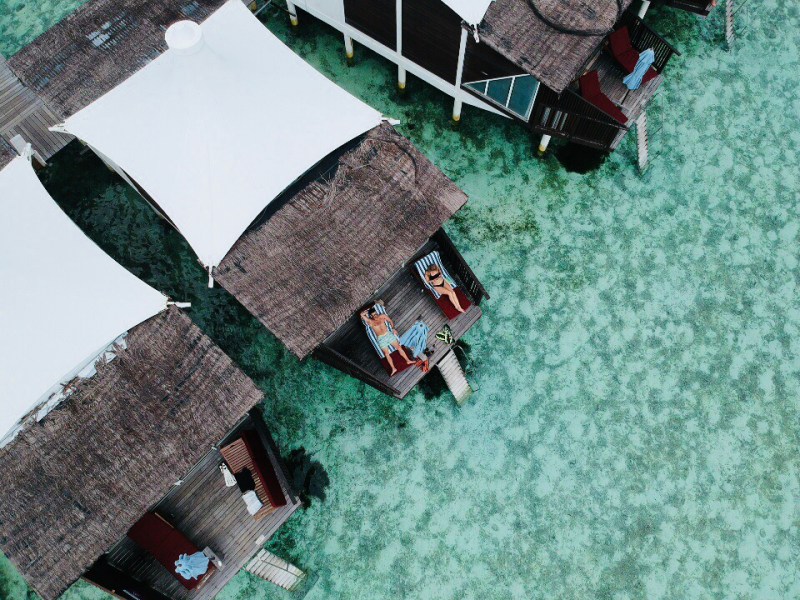
Our Over-Water Bungalow
Checking into our overwater bungalow was everything we imagined from the pictures. The island’s reception is carpeted in sand, so barefoot is very much encouraged. Then we walked a sandy path through the palms out to the docks, along the row of white-roofed bungalows to our very own hut.
We had a window in the floor to watch for fish and sea life, and a back porch with a ladder straight down into the sea. While you can certainly save some bucks by booking an on-land villa or a beachfront room (which most resorts offer), it is worth it to have direct access to those teal blue waters and instant snorkeling. You can even spot sea creatures by simply looking down.
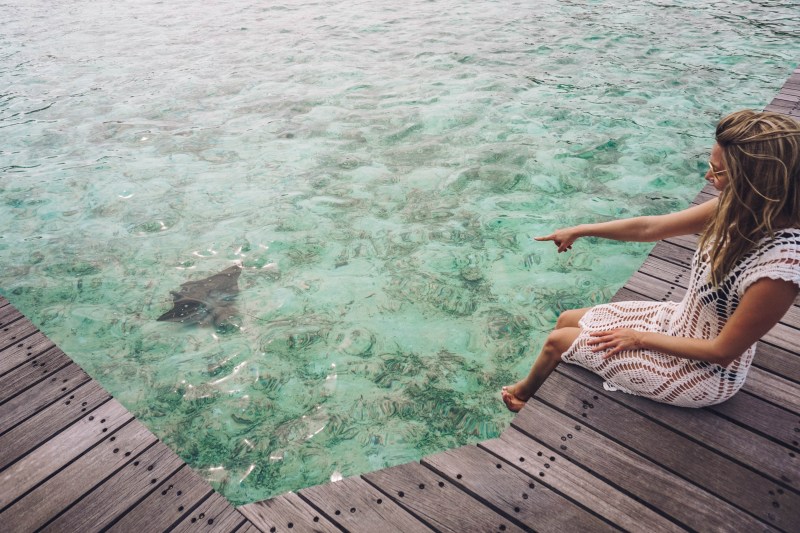
When It Rains, It Pours
This is especially true in the tropics. On our first night, a storm socked in and began dumping down. It felt like we were sleeping inside a circus tent as the raindrops battered the white canvas-like roof and lulled us to sleep.
We were less amused when it was still pouring when we woke up. Donning the rain ponchos from our bungalow’s wardrobe, we waited for a slight break in the downpour and slogged our way to breakfast.
The lady in the hut next door said she’d been there a week and this was the first day of rain. It’s probably best to expect rain so you aren’t disappointed. We ate breakfast, worked out in the mini gym, read in bed, and tried to make the most of it. I booked a spa treatment (a luxurious facial and massage combo) for the afternoon, and by the time I emerged from my facemask-induced meditative state, the rain was finally clearing up.
I wouldn’t place much stake in the weather forecast, since it fluctuated daily for us, and it’s good to remember that weather in the Maldives can change in a New York minute.
Island Life
Once the sun came out, we quickly settled into a pretty idyllic pace: wake up with the sun to the sound of the water lapping our abode. Step out onto the deck to enjoy the views and look for sea life. Walk to breakfast to for tropical fruits, pastries, and the omelet bar. Stroll the beach, explore the island, and challenge other couples to a game of darts or ping-pong. Laze in beach loungers or beanbag chairs or hammocks.
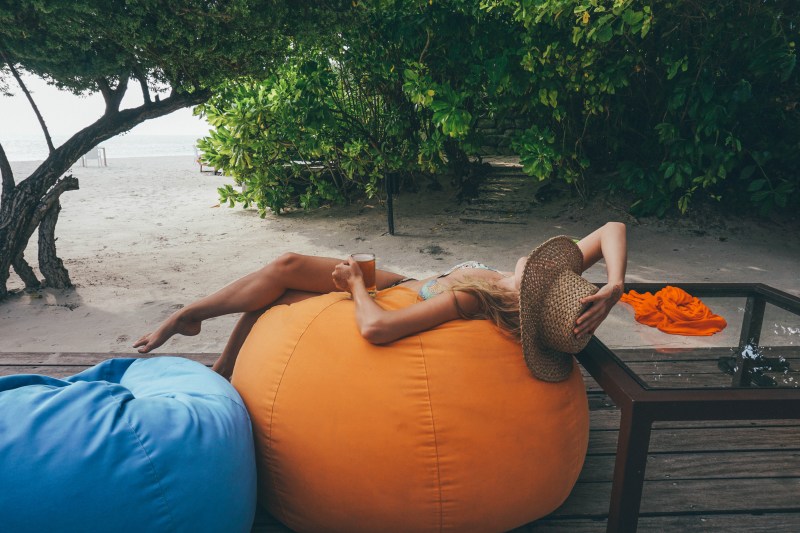
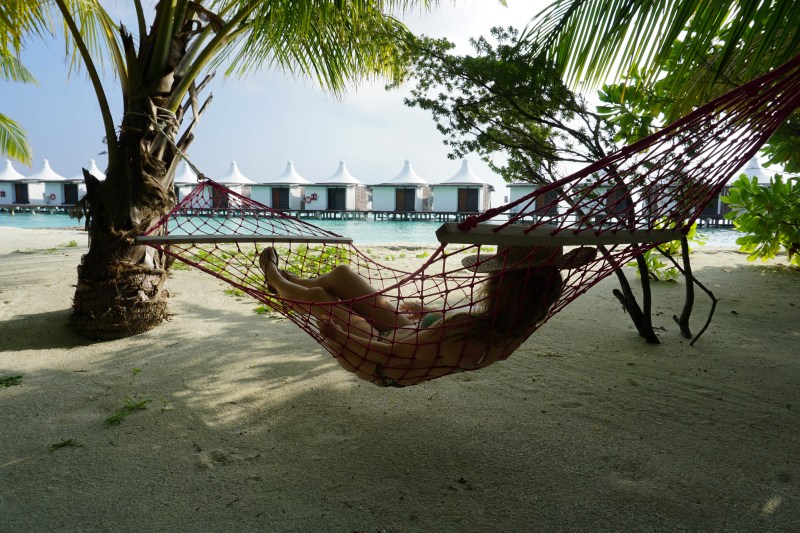
Our resort offered a whole menu of sea activities, including dolphin tours, windsurfing lessons, deep sea fishing, scuba diving, sailing, and jet ski rentals. Many people come to the Maldives for the scuba diving and go out twice a day. We are both beginner divers – have only gone once – so we opted for the snorkeling.
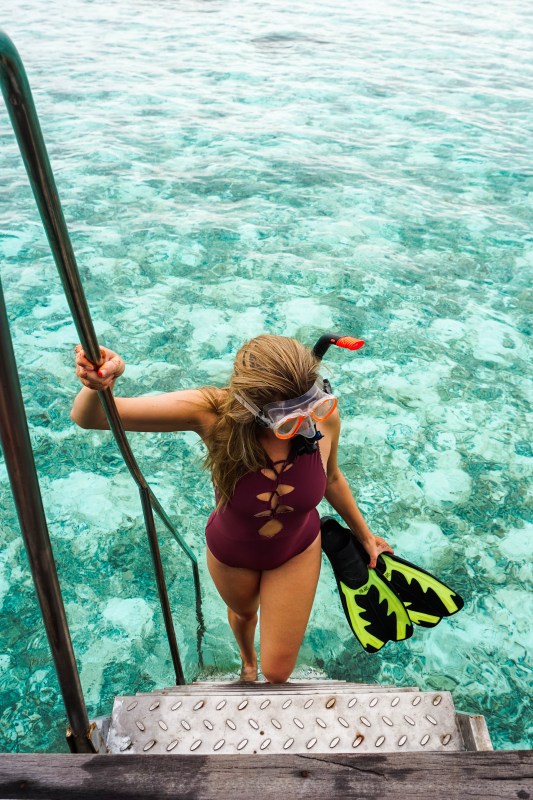
The snorkeling was an underwater paradise. We spotted an eel, an eagle ray, whiptail stingrays, two reef sharks, and fish of all sizes and colors – Brokenbar butterfly fish, Yellow Boxfish, Reef Bannerfish, Powder Blue SurgeonfishPesce, giant groupers, triggerfish, and needlefish. What’s more – because of the over-the-water bungalow, we enjoyed a daily snorkel off our back porch.
Snorkeling in the Maldives.(Sally Sorte)The resort also organized various evening entertainment ranging from beach dance parties to a drive-in style movie on the beach, with giant beanbags and blankets to sit on the sand. Our last night, we indulged in a romantic candle-lit dinner on the beach complete with a local Maldivian dance and drumming performance.
Is the Maldives sinking?
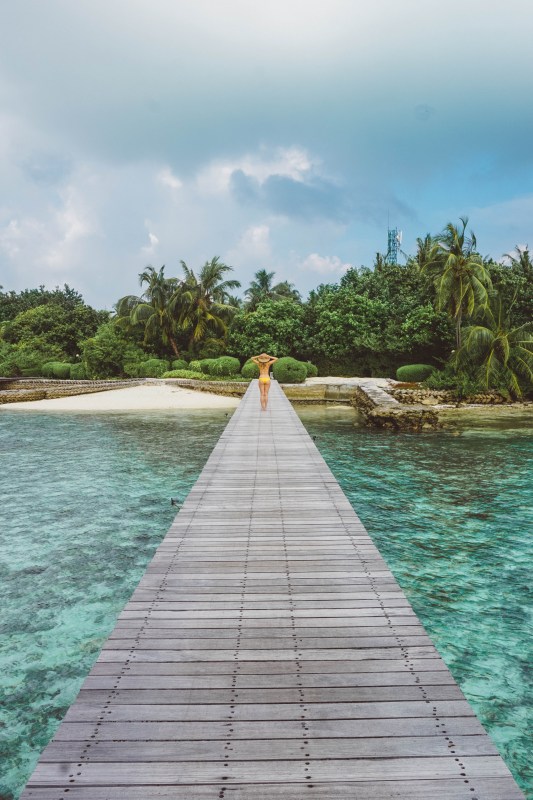
Yes and no. The Maldives is situated on the Chagos-Maldives-Laccadive Ridge. The reason the Maldives is sinking is due to climate change – causing rising sea levels at rates that coral growth cannot keep up with.
The Maldives is the lowest or flattest nation in the world, with an average ground level elevation of a whopping 4 feet and 11 inches and a peak elevation of 7 feet 10 inches.
The topography makes it particularly vulnerable to rising sea levels, which have been rising at a rate of 0.03-0.06 inches per year since the 1950’s and appear to be accelerating.
High surface erosion is also an issue. The Maldivians have taken measures to mitigate erosion, bringing in sand and building barricades, yet the rising water levels will eventually be a problem. Faraway storms also pose a threat, as high swells cause flooding.
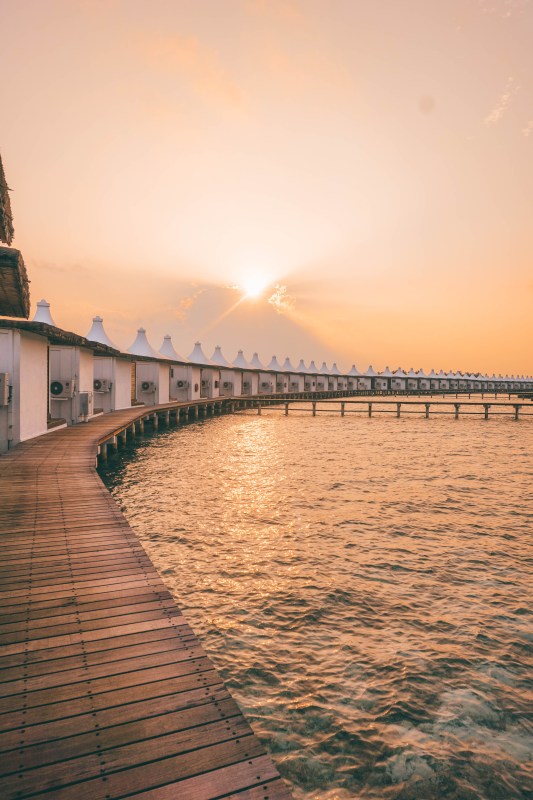
Due to the impending inundation, the Maldivian government committed to becoming carbon neutral by 2019. The Maldives is a unique microcosm, a case study of the risks that the rest of the world faces. If the Maldives can make good on their promise, they could set a precedent for other countries to follow.
Consensus varies as to when the Maldives will actually submerge; some sources say thirty years, some say eighty. Either way, you should visit this serene getaway before they disappear.
When I asked some Maldivian locals about the atolls sinking, they seemed unconcerned.
“It’s a long way away,” they shrugged. “When it happens, we’ll all just move to Australia.”
This article was featured in the InsideHook newsletter. Sign up now.
